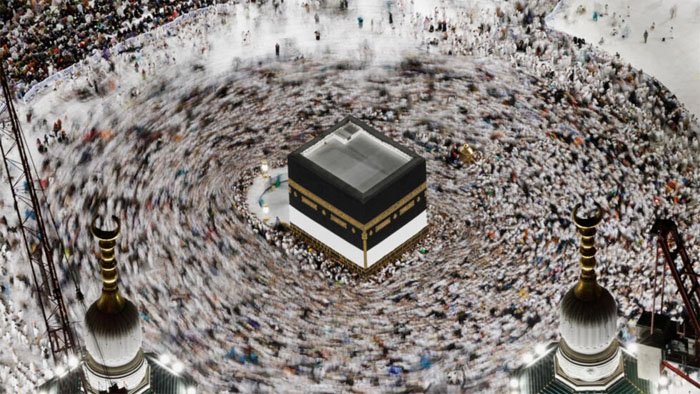
The annual Hajj pilgrimage officially began on Friday as pilgrims in Saudi Arabia made their way on foot and by bus to Mina, where they will camp at one of the largest tent cities in the world.
The Mina valley, about 5km east of the Grand Mosque in Makkah, is a 250-hectare open space covered by more than 100,000 air-conditioned tents that can accommodate more than 2.6 million people.
The eighth day of Dhul Al Hijjah on Friday, when pilgrims first begin to arrive in Mina, is called Yawm Al Tarwiyah, or the day of irrigation, because of a tradition in which people carry water with them to the site in preparation for the Day of Arafat, when Muslims climb Mount Arafat.
During the day, pilgrims will walk seven times around the Kaaba for the welcoming tawaf – also called the circumambulation of the Kaaba – and kiss the black stone.
In the afternoon, they will head to the Safa and Marwah hills near the Kaaba, where they either run or walk seven times between the hills, to symbolically emulate the run of Prophet Ishmael’s mother Hajjar in search of water for her son.
Pilgrims will then spend the entire day on Friday until dawn in Mina, where they will prepare for the Day of Arafat, the most important day of the Hajj pilgrimage.
Saudi officials said more than 1.5 million foreign pilgrims had arrived in the country by Tuesday, the vast majority by plane, with more expected.
They were set to be joined by hundreds of thousands of Saudis and others pilgrims resident in the kingdom on Friday.
“I consider myself very lucky to have been chosen to perform the Hajj this year and accompany my ageing father to Makkah to see him complete the five pillars of Islam,” Bahraini pilgrim Ahmed Mohammed told The National.
“Many don’t get the chance or wait their whole life to perform the Hajj but this year we were so happy when we made the cut.”
In 2019, more than 2.4 million Muslims made the pilgrimage. Saudi authorities control the flow of pilgrims through quotas, allowing each country one pilgrim for every thousand Muslim citizens.
In 2020 and 2021, Hajj was restricted to Saudi residents only due to Covid-19, with a limit of 60,000 pilgrims, compared with pre-pandemic numbers of 2.5 million.
On Tuesday, pilgrims thronged the Grand Mosque in Makkah, performing a ritual circuit as they walked seven times around the Kaaba, the cube-shaped structure inside the mosque that is considered Islam’s holiest site.
They wore ihrams, two unstitched sheets of white cloth that resemble a shroud.
Pilgrims head to the Mountain of Arafat on Saturday for a day-long vigil. They will then set off for to Muzdalifah, a rocky plain area a few kilometres away, where they will spend the night and collect pebbles to be used in the symbolic stoning of pillars representing the devil when they return to Mina the next day.
One of the world’s largest religious gatherings, the Hajj is one of the Five Pillars of Islam. All Muslims are required to undertake it at least once in their lives if they are physically and financially able to do so.
Those undertaking the pilgrimage see it as an opportunity to strengthen their faith, wipe out old sins and start new.
 Weekly Bangla Mirror | Bangla Mirror, Bangladeshi news in UK, bangla mirror news
Weekly Bangla Mirror | Bangla Mirror, Bangladeshi news in UK, bangla mirror news







